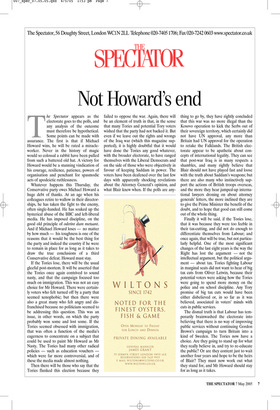Not Howard’s end
The Spectator appears as the electorate goes to the polls, and any analysis of the outcome must therefore be hypothetical. Some points can be made with assurance. The first is that if Michael Howard wins, he will be rated a miracleworker. Never in the history of magic would so colossal a rabbit have been pulled from such a battered old hat. A victory for Howard would be a stunning vindication of his courage, resilience, patience, powers of organisation and penchant for spasmodic acts of apodeictic ruthlessness.
Whatever happens this Thursday, the Conservative party owes Michael Howard a huge debt of thanks. At an age when his colleagues retire to wallow in their directorships, he has taken the fight to the enemy, often single-handed. He has soaked up the hysterical abuse of the BBC and left-liberal media. He has imposed discipline, on the good old principle of oderint dum metuant. And if Michael Howard loses — no matter by how much — his toughness is one of the reasons that it would be the best thing for the party and indeed the country if he were to remain in place for as long as it takes to draw the true conclusions of a third Conservative defeat. Howard must stay.
If the Tories lose, there will be the usual gleeful post-mortem. It will be asserted that the Tories once again contrived to sound nasty, and that the campaign focused too much on immigration. This was not an easy choice for Mr Howard. There were certainly voters who felt turned off by a party that seemed xenophobic; but then there were also a great many who felt angry and disfranchised because no politicians seemed to be addressing this question. This was an issue, in other words, on which the party probably won some and lost some. If the Tories seemed obsessed with immigration, that was often a function of the media’s eagerness to concentrate on a subject that could be used to paint Mr Howard as Mr Nasty. The Tories had many other radical policies — such as education vouchers which were far more controversial, and of these the media made almost nothing.
Then there will be those who say that the Tories flunked this election because they failed to oppose the war. Again, there will be an element of truth in that, in the sense that many Tories and potential Tory voters wished that the party had not backed it. But even if we leave out the rights and wrongs of the Iraq war (which this magazine supported), it is highly doubtful that it would have done the Tories any good whatever, with the broader electorate, to have ranged themselves with the Liberal Democrats and on the side of those who were objectively in favour of keeping Saddam in power. The voters have been deafened over the last few days with apparently shocking revelations about the Attorney General’s opinion, and what Blair knew when. If the polls are any thing to go by, they have rightly concluded that this war was no more illegal than the Kosovo operation to kick the Serbs out of their sovereign territory, which certainly did not have UN approval, any more than Britain had UN approval for the operation to retake the Falklands. The British electorate appear to be apathetic about concepts of international legality. They can see that post-war Iraq is in many respects a shambles, and many rightly believe that Blair should not have played fast and loose with the truth about Saddam’s weapons; but there are also many who instinctively support the actions of British troops overseas, and the more they hear jumped-up international lawyers droning on about attorney generals’ letters, the more inclined they are to give the Prime Minister the benefit of the doubt, and to hope that good can still come out of the whole thing.
Finally it will be said, if the Tories lose, that it was because they were too feeble in their tax-cutting, and did not do enough to differentiate themselves from Labour; and once again, that will be true, but not particularly helpful. One of the most significant changes of the last eight years is the way the Right has lost the argument — not the intellectual argument, but the political argument — about tax. Tories fighting Labour in marginal seats did not want to hear of big tax cuts from Oliver Letwin, because their potential voters were asking how the Tories were going to spend more money on the police and on school discipline. Any Tory promise of big tax cuts would have been either disbelieved or, in so far as it was believed, associated in voters’ minds with cuts in public services.
The dismal truth is that Labour has temporarily brainwashed the electorate into believing that there is no way of improving public services without continuing Gordon Brown’s campaign to turn Britain into a kind of Sweden. The Tories now have a choice. Are they going to stand up for what they really believe in, and try to re-educate the public? Or are they content just to wait another four years and hope to be the heirs of Blair? They must now work out what they stand for, and Mr Howard should stay for as long as it takes.



























































 Previous page
Previous page